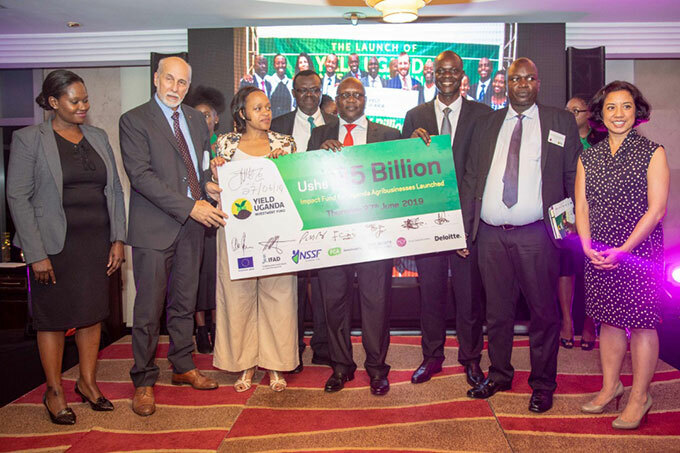European Union's investment fund gets sh34b to boost agribusiness
Jul 04, 2019
Set up in January 2017 by the European Union (EU), through the International Fund for Agricultural Development (IFAD) and the National Social Security Fund (NSSF), with an initial €12m investment, Yield Uganda Investment Fund has now hit €20m.

AGRIBUSINESS
The European Union's agribusiness fund dubbed Yield Uganda Investment Fund has received €8m (approximately sh34b) to support agro-processing industries by giving them low-interest loans and equities.
The funding was given to the Fund by funding partners Open Society Foundations (OSF) and FCA Investments (FCAI).
During the press conference that took place in Nakasero on Thursday morning, Adolfo Cires Alonso, the programme manager finance, agribusiness and land at European Union Delegation to Uganda said small business growth is hampered by limited access to credit.
This, according to him is one of the reasons why EU set up the Fund to enhance access to loans to small companies involved in agribusiness.

"We got two additional investors who joined us recently, but our aim is to support companies involved in agro-processing to boost the growth and transformation of the agricultural sector. We look at small companies which are involved in the creation of jobs through commercial agriculture," he said.
Set up in January 2017 by the European Union (EU), through the International Fund for Agricultural Development (IFAD) and the National Social Security Fund (NSSF), with an initial €12m investment, Yield Uganda Investment Fund has now hit €20m.
The fund is managed by renowned financial service provider firm, Deloitte Uganda and Pearl Capital Partners Uganda (PCP), a capital market player.
According to Alonso, the fund targets agriculture-related businesses across all value chains including the supply of agricultural inputs, production, and agro-processing within all sub-sectors, post-harvest storage, and distribution, but also peripheral activities such as transportation, communications, and certification.
"The fund seeks to support businesses with a clear competitive advantage and ambitious local management. The fund targets to improve over 100,000 rural households livelihoods through improving access to markets for their produce, higher quality agricultural inputs, and services," he stated.
Meanwhile while during an event to receive the funding, the EU Ambassador to Uganda, Attilio Pacific said through European External Investment Plan, the EU is aiming at attracting capital into Uganda to foster development in agriculture, trade, and industrialization.
"Mobilizing investments for the agro industrialization of Uganda has been the main reason for the creation of Yield Uganda Investment Fund by the EU. In 2017 NSSF joined the EU to launch the first Investment Fund and today FCA Investments and Open Society Foundation add substantial capital which will allow Ugandan agribusiness companies to access the needed long-term capital for industrialization," he said.
Dr. Edward Isingoma, Managing Partner, Pearl Capital Partners (PCP) said Yield Uganda since its inception has been built around the unique conducive agri-business environment found in Uganda
"The environment here is not only rich in potential but which also gives us the opportunity to bring about real change and impact upon the lives of smallholder farmers and rural communities that remain the majority agri-partners in various ways now and over the coming years," he said.
According to Isingoma, Yield Fund is uniquely positioned to drive forward that change, by making strategic, effective and efficient on the ground investments. He promised to bring flexible and innovative financing solutions to the agri-business SME community, enabling several partners prosperity for the future.
"By utilising our impact Investing experiences and principles, we believe that we will also create the core foundations from which the SME agri-business sector and smallholder farmer communities can develop and grow together," he stated.
